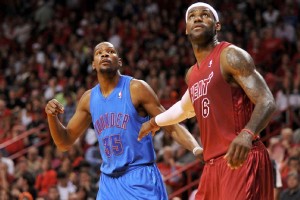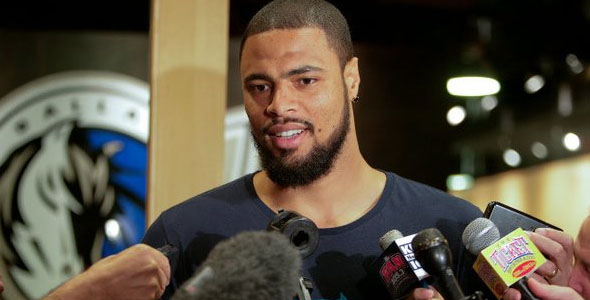 Biggie Smalls, Mase and, at the time, Puff Daddy said it best.
Biggie Smalls, Mase and, at the time, Puff Daddy said it best.
Mo money, mo problems.
The NBA’s fancy new $24 billion TV deal has people thinking. It has them thinking about a salary-cap explosion. It has them thinking about another lockout in 2017. It has them thinking about 2016 free agency. And, not surprisingly, it has them thinking about whether or not the concept of a max salary is fair.
New NBA Players Association director Michele Roberts doesn’t think the latter is. Here’s what she said during an interview with Chris Sheridan of SheridanHoops.com:
S: “Your thoughts on the max salary?”
MR: “I have difficulty with rules that suggest that for some reason, in this space, we are not going to allow you to do what is ordinarily allowed in every other aspect of American life – you can work and get compensated at the level that someone thinks you’re worth being compensated at. And for all the reasons that it might be reasonable, it still – as a base – the premise offends me. So for me, there needs to be a justification that is substantial. And I’m told that in large part it’s because there’s an inability on the part of some owners to control their check-writing habits. So that’s where I am. Now, there’s a history that led up to max contracts, and I’m not going to pretend it’s not significant. But if you ask me off the cuff, that’s my response.”
Um, wow. What an answer. What a great freaking answer. I won’t pretend to know much about Roberts, though the little I do know suggests this type of intelligible response is par for the course. People respect her, and she’s already proving to be an upgrade over the drama-dipped Billy Hunter.
Now, about those max contracts…
Roberts makes really good points. Typical Americans aren’t told “You cannot, under any circumstance, make more than this.” They have the ability to make what they’re worth, whether that’s $30,000 or $30 million.
Of course, you’re not going to find many people who necessarily sympathize with players. Even though you have to judge their salaries and market value by their profession, they make a lot of money. Most aren’t bringing home that type of coin, and there are a ton of people who feel they’re worth more than their current job is paying. That LeBron James is making under $50 million annually—or however much his brand as a player is actually worth—isn’t something people lose sleep over.
But it’s all relative.
Player earning potentials are determined by league-wide revenue. If the NBA has the ability sign whatever TV deals they can, if owner profits aren’t capped out, why should player salaries be? And yet on the other hand, Joe Schmoe who manages a supermarket isn’t necessarily getting paid enough either, even though he might be integral to keeping the ship afloat.
Fair or not, NBA players do have leverage if this becomes a more serious talking point. They’re not as replaceable as most workers. Without them, the product suffers or disappears altogether, so they have that going for him. If doing away with max contracts becomes something the league considers, it will be interesting to see how that impacts the salary cap. Limitless earning potential makes building a team more complicated when confined by financial ceilings.
Basically, all this means is you better strap yourself in. Inevitable labor negotiations figure to be a bumpy-ass ride.
Dan Favale is a firm believer in the three-pointer as well as the notion that defense doesn’t always win championships. His musings can be found at Bleacherreport.com in addition to TheHoopDoctors.com.



















